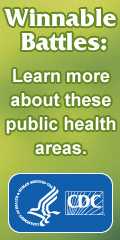October 2014
Did You Know? is a weekly feature from the Office for State, Tribal, Local and Territorial Support to inform your prevention activities. We invite you to read, share, and take action!
View the Current Did You Know?
October 31, 2014
- The CDC National Health Report 2014 finds Americans are living longer than ever, but unhealthy behaviors and related risks continue to compromise their health.
- With 1 in 4 adults smoking and 1 in 3 adults obese, heart disease and cancer [PDF-3.2MB] remain the top two causes of death in the US.
- You can use the National Health Report dashboards to view our nation’s progress for 18 different health issues and find tools to drive success.
October 24, 2014
- CDC has released updated guidance on personal protective equipment (PPE) to be used by healthcare workers during management of patients with Ebola virus disease in US hospitals, including procedures for putting on (donning) and removing (doffing).
- Starting October 27, public health authorities will conduct active post-arrival monitoring of all travelers whose travel originated in the Ebola-affected countries of Liberia, Sierra Leone, or Guinea.
- CDC reminds healthcare workers to “Think Ebola” [PDF–149KB] by taking a detailed travel and exposure history for any patient with fever, severe headache, muscle pain, weakness, diarrhea, vomiting, stomach pain, or unexplained hemorrhage.
October 17, 2014
- Many children in almost every state are getting severe respiratory illnesses from enterovirus D68 (EV-D68) this year.
- Children with asthma are especially at risk for severe symptoms, such as difficulty breathing and wheezing. See what all parents need to know about EV-D68.
- Healthcare providers should follow CDC guidance for identifying patients who may have EV-D68, testing of specimens, and reporting to health departments.
October 10, 2014
- According to this month’s Vital Signs, Americans spend more than 1 million days in the hospital each year from motor vehicle crash injuries.
- Crash injuries that happened in 2012 cost an estimated $18 billion in lifetime medical expenses and another $33 billion in lifetime work lost.
- No states have fully implemented all of the key interventions proven to keep people safe on the road. CDC’s new tool, Motor Vehicle PICCS, can help inform state decision making.
October 3, 2014
- One trillion germs [PDF–345KB] can live in one gram of poop!
- Washing hands with soap for just 20 seconds can significantly reduce rates of colds and diarrhea.
- You can promote handwashing and Global Handwashing Day on October 15 with these tools and materials.
Did You Know? information and web links are current as of their publication date. They may become outdated over time.
- Page last reviewed: November 9, 2015
- Page last updated: October 14, 2016
- Content source:



 ShareCompartir
ShareCompartir



